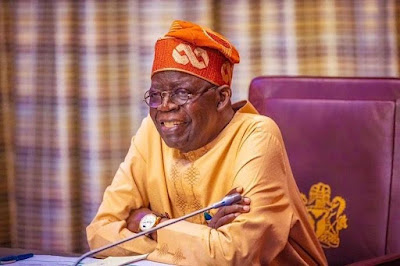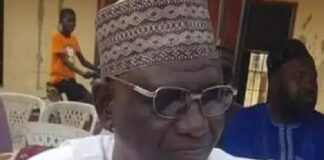In eight months of Tinubu administration, Nigeria’s stock market leads the world | By Bayo Onanuga

The Nigerian economy is looking good in some sectors. This is not a harebrained assessment, despite the high inflation and the unstable exchange rate of the Naira. Those who doubt this don’t need to look far, for a reality check.
The economic boom is happening at the Nigerian Exchange, where stockholders are not only recording unprecedented capital gains, but are poised to earn equally unprecedented dividends on their investments.
The prosperity promised by President Bola Ahmed Tinubu during the campaign is becoming a reality, for millions of Nigerian investors, among whom will be the 6.6 million Nigerian shareholders of MTN, the biggest telco in the country.
The upswing in the market began 30 May 2023, the second day Tinubu was sworn into office. What triggered the big rally in the market was the announcement by the new President of the end of the fraudulent petrol subsidy regime.
The market took notice of this bold measure, along with the President’s promise to harmonise the exchange rate. Although the latter remains ‘work-in-progress’, it has been a bullish run in the market since then.
The All Share Index which tracks the general market movement of all listed equities on the Nigerian exchange was 55,738.35 on 30 May 2023, a day after Tinubu was sworn in. In July it rose to 65,091. By 24 December, it reached 73,768, which as Bloomberg reported on 1 November, when the ASI first crossed the 70,000 mark, was the highest on record.
As at the close of trading on Friday 19 January, the index leapfrogged to 94,538.12, more than 69 percent growth, since last May, creating yet another huge record. Market capitalisation also grew exponentially from N30.3 trillion recorded at end of May 2023 to N51.7 trillion on 19 January 2024.
This means investors have gained more than N20 trillion since Tinubu came into office. The record gains have made the Nigerian Stock Market the best in the world, outperforming the MSCI Emerging Markets Europe, Middle East and Africa Index.
Not surprising, investors are bringing more and more money to the market. Last Friday alone, 844.4 million units of stocks valued at N15 billion were traded in 15,255 deals. The phenomenal growth of the market was fuelled by the record profits announced by many Nigerian banks and some of the manufacturers, such as Dangote Cement, BUA Cement, Lafarge Africa, formerly known as WAPCO.
The banks were the first to rally the market into a frenzy, beginning from their second quarter reports, when they reported huge gains from their forex dealings.
Zenith announced earnings per share in H1 at N9.29 from N3.55 in the same period of 2022. UBA’s earnings per share stood at N10.95 in H1 2023 from N1.98 per share in the same period of 2022. The positive Q3 reports also threw the market into more frenzy as banks announced further increases in profits. Investors, in response lapped up the shares of the banks, sending the prices higher.
UBA Plc which at the beginning of 2023 was trading at about N8 has seen the biggest jump in its stock price. By last Friday, it traded for N32. Access Bank which started the year at about N11-N12, has soared to N29. Zenith and GTCO are now trading in the N40s, from about N24-25 in January 2023. First Bank , FCMB, Fidelity, Sterling, Wema, Stanbic have all experienced the upswing in prices. Dangote Cement, BUA Cement and BUA Foods, Flour Mills of Nigeria, Okomu Oil, Presco, Transcorp, NAHCO and WAPCO have similarly experienced some boom.
Dangote on Friday, sold for N538, adding N48.9 to its weight, from its previous close of N489.9. WAPCO, otherwise known as Lafarge Africa traded at N31 in December. On 19 January, it traded for N47. The rise in stock prices is being propelled by investors who are taking positions, according to EDC Securities Research, “in fundamentally driven stocks as we approach the earnings season”.
The expectations and sentiments out there among the investors are that some dividend windfall is on the way.
The prosperity promised by the Tinubu administration may not be felt by all our 200 million people simultaneously. But it will not be far away as the government confronts the low inflow of forex into the economy, the fundamental reason exchange rate has gone bonkers and prices of imported and locally produced goods have increased.
President Tinubu and his cabinet expressed concern about the rising costs of pharmaceutical products at the last Federal Executive Council meeting. His government is poised to implement a series of measures to assist local drug manufacturers so that they lower the costs.
To address the low forex inflow, Nigeria is discussing as much as $1.5 billion of World Bank funding support for the budget, Finance Minister Wale Edun said in a Bloomberg Television interview.
The country is also looking forward to the fulfilment of the pledge by Saudi Arabia to invest billions of dollars in our economy.
NNPC Limited in the coming weeks will continue to be under pressure to bring in more dollars into the country’s foreign reserve to boost dollar availability and overturn bleak predictions for the national currency in 2024.
*Onanuga is the special adviser Information and Strategy to President Bola Tinubu.















